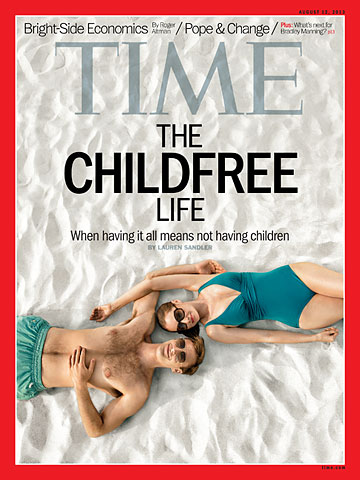Last week, late night talk show host Jimmy Fallon announced the birth of his daughter, Winnie, via a surrogate. Fallon reports struggling with infertility as a couple for 5 years, and is (understandably) over the moon for his daughter: “…if there’s anyone out there who is trying and they’re just losing hope … just hang in there,” Fallon said. “It’s all worth it.”
The other major story about parenting is Lauren Sandler’s cover story in the August 12 issue of TIME magazine about the increasing number of couples who have chosen not to become parents – or, in the words of one woman quoted in the story, to remain “child free.” Sandler cites a 2010 Pew research study that notes that the rate of women who have never had a child has risen to 1 in 5, up from 1 in 10 in 1970.
Both of these stories should be lauded for bringing issues of reproduction and choice to the national conversation. Despite the frequency of infertility, many couples, and women in particular, feel alone in their struggle, and Fallon’s public disclosure about their difficulties may offer solidarity with and for these women. And by offering a cover story on women who have chosen not to raise children, Sandler’s story validates an often neglected topic.
Yet in both cases, important details are omitted. News commentators have acknowledged that surrogacy is a “complicated” process, but “complicated” hardly scratches the surface of the issue. Laws regarding surrogacy contracts vary from state to state, ranging from barring the practice entirely to endorsing it via state statute (and everything in between). Importantly, there are significant ethical questions raised about the practice of surrogacy: some argue that contract pregnancy exploits women by commodifying the act of gestation — paying someone to carry a baby to term (Krimmel, H T. “The case against surrogate parenting.” The Hastings Center report 13.5 (1983):35-39.). Others have argued that these arrangements in fact empower women by recognizing the “socially useful enterprise” that is gestation (Purdy, Laura M. “Surrogate mothering: exploitation or empowerment?.” Bioethics 3.1 (1989):18-34.). Additionally, as with many assisted reproductive technologies, surrogacy is only available to those who have the social and economic means to enter into such arrangements, and as a result this method of childbearing is limited to the “haves” among us.
Fallon’s public jubilation about his daughter is considered natural and appropriate; whereas the option to remain child free in a decidedly pronatalist culture still remains a curiosity. 38% of the people surveyed in a 2009 Pew Research Center poll thought that the increasing number of women choosing not to have children was “bad for society,” and although the most educated women surveyed were those least likely to have a child, the proportion of those with advanced and professional degrees remaining childless dropped from 31% in 1994 to 24% in 2008. And once those women become mothers, traditional gender roles still remain prevalent in the American psyche: a 2011 survey revealed that only 16% of respondents thought it was ideal for a young child to have a mother (note – not parent) who works full time, with 42% agreeing that a mother who works part-time would be perfect. Interestingly, one of the criticisms of Sandler’s article was that men were largely absent from the story, not in terms of procreative partners but rather as social commentators. As Amanda Marcott commented, until men also see themselves as complete beings without having to be a father, we won’t know whether or not gender roles are truly liberated from tradition. It is this liberation from tradition that will enable us to celebrate any reproductive choice, from surrogacy to remaining child-free, as one that is authentic and enduring.



